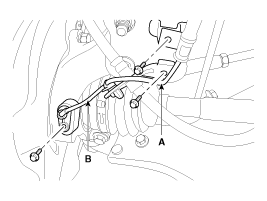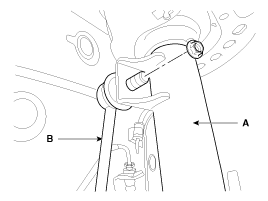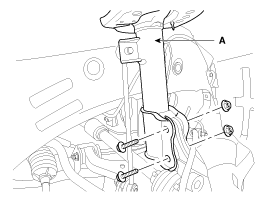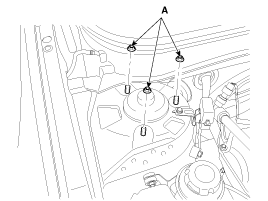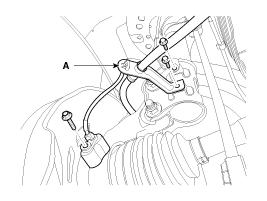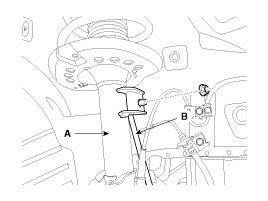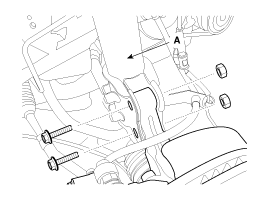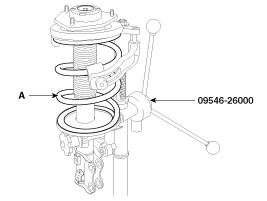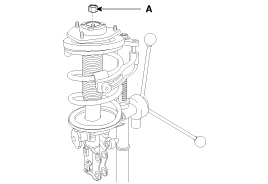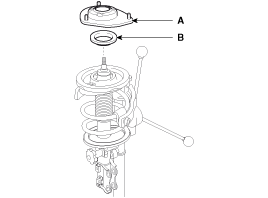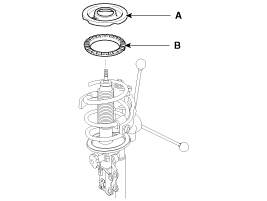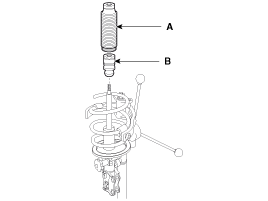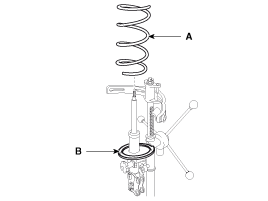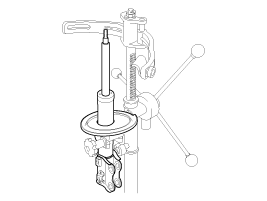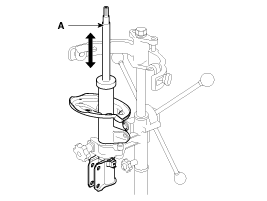 Hyundai Sonata: Front Strut Assembly. Repair procedures - Revised
Hyundai Sonata: Front Strut Assembly. Repair procedures - Revised
Replacement
| 1. |
Remove the front wheel & tire.
|
| 2. |
Remove the brake hose (A) & wheel speed sensor bracket (B) from
the front strut assembly by loosening mounting bolts.
|
| 3. |
Disconnect the stabilizer link (B) with the front strut assembly
(A) after loosening the nut.
|
| 4. |
Disconnect the front strut assembly (A) with the knuckle by loosening
the bolt & nut.
|
| 5. |
Remove the front strut assembly and then loosen the strut mounting
nuts (A).
|
| 6. |
Installation is the reverse of removal.
|
Replacement
| 1. |
Remove the front wheel & tire.
|
| 2. |
Remove the brake hose (A) & wheel speed sensor bracket (B) from
the front strut assembly by loosening mounting bolts.
|
| 3. |
Disconnect the stabilizer link (B) with the front strut assembly
(A) after loosening the nut.
|
| 4. |
Disconnect the front strut assembly (A) with the knuckle by loosening
the bolt & nut.
|
| 5. |
Remove the front strut assembly and then loosen the strut mounting
nuts (A).
|
| 6. |
Installation is the reverse of removal.
|
Disassembly
| 1. |
Compress the coil spring with a SST(09546-26000).
Do not compress the spring more than necessary.
|
| 2. |
Loosen the self locking nuts (A).
|
| 3. |
Remove the insulator assembly (A) and the strut bearing (B).
|
| 4. |
Remove the spring upper seat (A) and pad (B).
|
| 5. |
Remove the dust cover (A) and the bumper rubber (B).
|
| 6. |
Remove the coil spring (A) and the spring lower pad (B).
|
| 7. |
Remove the shock absorber (A) from the specialtool.
|
| 8. |
Reassembly is the reverse of the disassembly.
|
Inspection
| 1. |
Check the strut bearing for wear and damage.
|
| 2. |
Check the spring upper and lower seat for damage and deterioration.
|
| 3. |
Compress and extend the piston rod (A) and check that there is
no abnormal resistance or unusual sound during operation.
|
 Front Strut Assembly. Components and Components Location
Front Strut Assembly. Components and Components Location
Components
1. Insulator cap
2. Insulator assembly
3. Strut bearing
4. Spring upper seat
5. Spring upper pad
6. Coil spring
7. Spring lower pad
8. Dust ...
 Front Lower Arm. Repair procedures - Revised
Front Lower Arm. Repair procedures - Revised
Replacement
1.
Remove the front wheel & tire.
Tightening torque:
88.3 ~ 107.9 N.m (9.0 ~ 11.0 kgf.m, 65.1 ~ 79.6 lb-ft)
...
See also:
Curtain Airbag (CAB) Module. Components and Components Location
Components
...
Master Cylinder. Components and Components Location
Components
1. Reservoir cap
2. Reservoir
3. Grommet
4. Master cylinder
...
Description and Operation
Operation
Concentric Slave Cylinder-C.S.C
When the clutch pedal is pressed, oil pressure is transmitted along the
arrow directions shown below and that moves the clutch slave cylin ...

